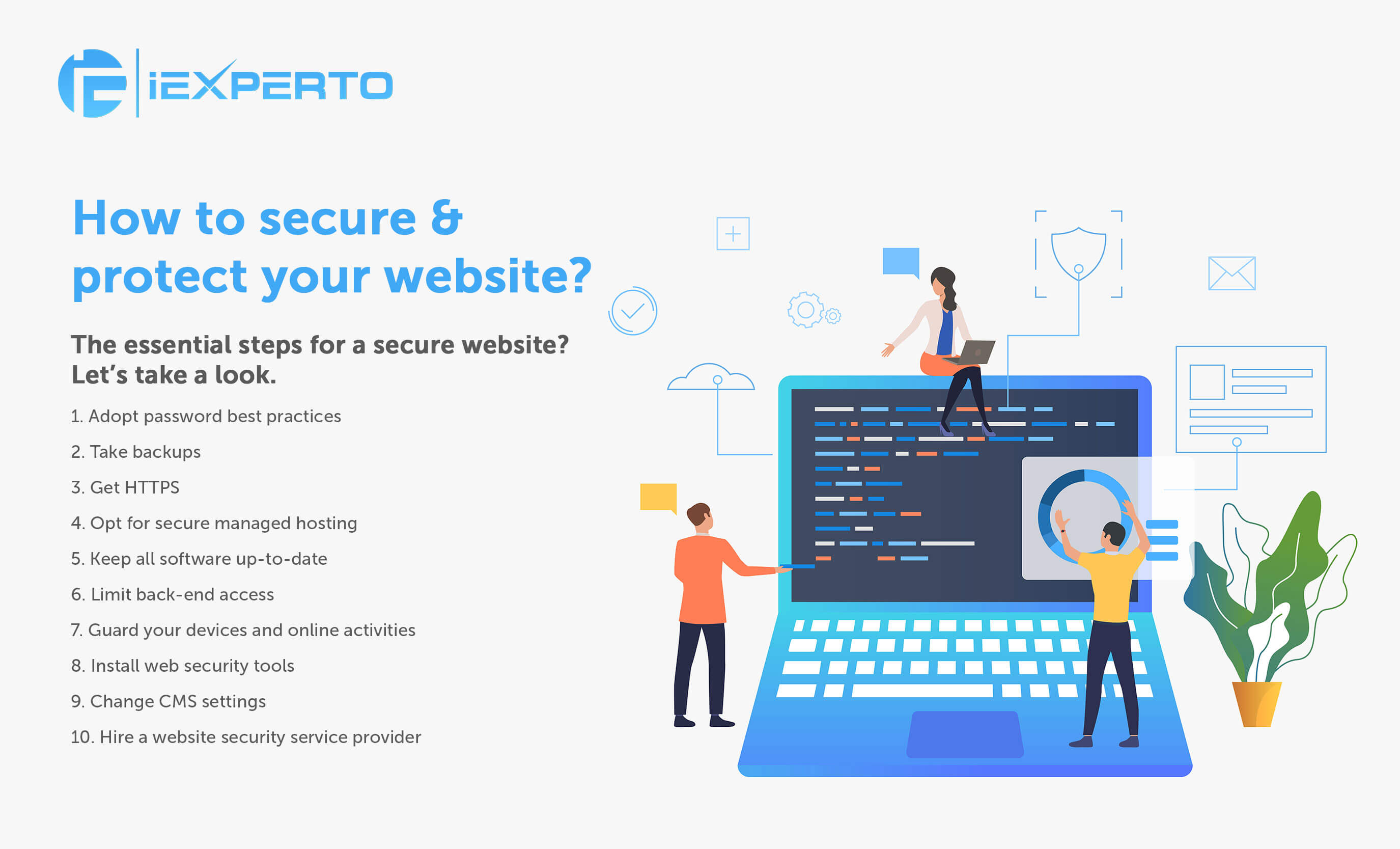
Your website provides an essential gateway to your customers. And by leaving it unsecured, you could be inviting a host of trouble. According to IBM, the cost of a security breach is $3.86 million on average, and it could take around 207 days to detect. The implications of these don’t spare smaller businesses either.
So, developing cybersecurity awareness and building enough protective barriers to secure your website and its data is imperative to avoid the fatal consequences of a security breach.
What is website security?
Website security is the process of protecting your website and its data. This can involve a variety of actions, from adopting security best practices to updating your security infrastructure and training employees.
Now, website security is not a one-time initiative or a fix-it-all solution. Cyberthreats can evolve in rapid strides over time. So, your website needs ongoing attention to keep it safe and protected in the long run.
Why websites get hacked?
So, why do websites get hacked? Well, there could be countless reasons. As much as 90% of breaches have financial motivates. Customer data, for instance, comes with a high price tag. Criminals could sell them on the dark web or use them to commit other illegal activities. Then there are ransomware attacks that could take your website and databases hostage until you pay up a ransom. Some attacks are launched to cause deliberate reputational damage.
Whatever the motivation, hacking attacks are on the rise, and technology is providing a significant boost to criminals. Automated website attacks, for example, have dramatically brought down the time, cost, and resources needed to launch mass-scale attacks. Open software tools like CMSs could also leave your site vulnerable and exposed to an attack if left unsecured.
Top reasons why website security is important
Malicious cyberattacks are rising each year. Cybersecurity Ventures, for instance, estimates that there will be a ransomware attack on businesses every 11 seconds during 2021. That’s nearly a four-fold increase from just five years back. And protecting your website from these threats is critical for your business due to several reasons.
1. Recovering from a hacking attack is costly.
A security breach is a costly affair. It could involve court fines, compensation for those affected, repairs and upgrades to your IT infrastructure, and many other direct and indirect costs. Compared to this, taking preventative measures would be far less of a drain on your budgets.
2. You have an obligation to protect your customers.
As a business, you could be privy to a ton of customer data, from their names and addresses to personal preferences and even payment details. And you have an obligation to protect them. But a security breach could compromise all these data in a blink of an eye.
There are other potential threats, too. A hacked website could download malware to your customers’ devices or target them for a phishing attack by redirecting to a malicious site. There are many ways an unsecured website could leave your customers vulnerable. And the only way to prevent these is by keeping your site security up-to-date.
3. A breached site could damage your business reputation.
A security breach could mean lost credibility in the eyes of your customers and months in courts and public investigations. This can cause significant reputational damage that could take years to recover from. Malicious actors could even take over your website and populate content that’s damaging to your company’s reputation. But you can avoid all these with a proactive approach to website security.
4. A security lapse could damage sales.
News of a hacked website could drive away your customers, causing conversions and revenue to plunge. Then don’t forget the loss in sales due to security-related downtime. And to make matters worse, when your site comes under threat, search engines like Google could block users from visiting it. This could be a fatal blow to your SEO efforts and could cause a severe dent in revenue.
5. Safeguarding your site is essential to remain competitive.
A hacking attack could expose sensitive business information that provides you a distinct edge over your competitors. These can include customer databases, proprietary information such as licenses, and product blueprints. That’s another compelling reason to bolster site security.
Website vulnerabilities & threats
Now, before we dig deep into how you could strengthen website security, let’s first take a look at the biggest vulnerabilities and threats your site could experience.
- SQL injections: This is a common vulnerability that allows malicious actors to access your back-end SQL databases so they could view confidential information such as customer databases and passwords. Hackers might even be able to add, delete, or change data.
- Cross-site scripting (XSS): When an application uses unverified data and sends them to your website visitor’s browser, it could open up opportunities for a hacker to execute various malicious acts. For example, they could redirect the user to a malicious site, launch malware, and hijack user sessions.
- Brute force attacks: Hackers could also apply aggressive techniques, often automated, to determine login credentials. This may compromise customer accounts and other sensitive data along the way.
- Malware attacks: Both you and your customers could be the target of a malware attack that makes use of various loopholes in the security infrastructure. These can include unpatched vulnerabilities, firewall issues, and deprecated functions in your website code.
- Denial-of-service (DoS) attacks: A hacker could also flood your server with a large number of requests, making your site temporarily unavailable to your customers. These are frequently used to launch further attacks on businesses.
Now that you have a basic understanding of the importance of website security and various security threats, let’s take a closer look at the right approaches, techniques, and tools to keep your website safe.
Information security CIA triad
Information security professionals often adopt the CIA triad to guide their strategies. CIA stands for 3 essential elements of data security:
1. Confidentiality
Your website will contain different types of data with varying degrees of sensitivity that should only be available for authorized users to access.
2. Integrity
To maintain integrity, data must be accurate and in the originally intended form without any unauthorized changes, either deliberate or unintentional.
3. Availability
Data must also be available and accessible to authorized users when needed.
But why is this CIA triad important? When devising strategies to ensure your website security, it’s essential to strike a balance between these 3 elements. For example, excessive security measures to maintain confidentiality might make your site less accessible to your customers. This would defeat the purpose and may drive them away for good. So, the CIA triad should be an important consideration when making those critical decisions to boost site security.
Website security framework
The National Institute of Standards and Technology (NIST) provides a cybersecurity framework to build your web security environment. It contains 5 functions that provide a logical sequence to organize your resources and processes.
- Identify: Developing an in-depth understanding of your organization’s needs, resources, challenges, and goals can help you prioritize security measures.
- Protect: This involves taking preventative steps to avoid the impact of a security threat, for example, with access controls, maintenance, and employee training.
- Detect: Staying vigilant and proactively taking steps to monitor and identify security threats could help mitigate their impact. The effective detection and analysis of cybersecurity vulnerabilities are also critical to evade threats before they arise.
- Respond: This is about tackling security threats by responding on time with effective strategies.
- Recover: Taking measures to recover quickly from the impact can help establish normalcy and minimize downtime. It’s equally important at this stage to devise solutions to build resilience so you can learn and avoid such threats in the future.
In addition, preparation and planning play an important role in setting up your website’s security ecosystem. It’s not just about devising strict processes and adopting security best practices. Identifying the necessary resources, budgets, and talent are also essential. How much budget should you allocate? What roles do you need to fill and outsource? What software and hardware resources would you need? These are all important questions to ask at the outset.
How to secure & protect your website?
So, what are the essential steps for a secure website? Let’s take a look.
1. Adopt password best practices
Setting up and maintaining a website will require the use of various passwords. These are often your first line of defense. And when compromised, they can provide a gateway for unauthorized access. So, adopting password best practices is a must.
- Set up lengthy passwords using a combination of uppercase and lowercase letters, numbers, and special characters.
- Avoid using guessable phrases and personal information like birthdays and names.
- Use a separate password for each user access and account.
- Avoid writing them down or sharing them with others.
- Change passwords every few months.
2. Take backups
Taking regular backups is essential to recover quickly from a cyberattack. It can help minimize damage and the impact of downtime. Manually taking backups, however, could be a tedious process. So, you can always opt for an automated solution. But remember to store your backups off-site.
3. Get HTTPS
HTTPS enables the secure transmission of data from your website to the database. This is particularly essential when transmitting sensitive information such as your customer’s payment details or login credentials. It can prevent hackers from infiltrating the data transferring process. With an SSL certificate, you can easily encrypt the transferred information, making it hard for an outsider to read. It can also provide extra assurance to your customers about your website’s security.
4. Opt for secure managed hosting
Your web hosting service plays an important role in ensuring your site security. Shared hosting, in particular, could lead to a lot of headaches, although they are often less costly. Opting for a managed hosting solution with excellent security features could help you avoid many of these challenges.
5. Keep all software up-to-date
Using outdated software could make your website vulnerable to hacking attacks. But software developers frequently release updates with patches to iron out any loopholes that could invite security threats. So, keeping your software up-to-date is essential. Opt for automatic updates to minimize the time-consuming manual work.
6. Limit back-end access
The more employees you have with back-end access to the website, the higher the chances of a costly mistake that could leave your site exposed. After all, 88% of security breaches are the result of human error. So, limit access to a few employees and ensure you train them in essential security practices. Tracking user activities by keeping logs can also help improve accountability and will be useful when tracing the root cause of a breach.
7. Guard your devices and online activities
Using a compromised device to access your website can expose it to a malware infection or other such threat. So, adopting best practices to ensure the safety of your devices is essential. Install a reputed virus guard and keep all software updated. Watch out for malware-infected downloads, phishing attacks, unsecured external storage devices, and malicious websites. While you’re at it, ensure your employees adopt similar practices and strengthen network security with strict security policies.
8. Install web security tools
Today, there are plenty of tools to monitor your website and alert you to any threats. These can help minimize potential damage by enabling you to react faster and more effectively. If you’re using WordPress, then there are plugins to help you achieve this. But ensure you opt for reputed tools to avoid unnecessary threats arising from third-party vulnerabilities. Check reviews for user feedback, spend time to understand the features and benefits, and install only what will add value to your business.
9. Change CMS settings
Your content management system comes with default settings, which can expose your site to a hacking attack. Many website owners forget to change these, creating a predictable path to your website for malicious actors. So, if you still haven’t changed the default settings, it’s time to customize each feature. These can include file permissions, comments, and user visibility.
10. Hire a website security service provider
If all these security steps seem overwhelming to you, hiring a website security provider would be your best bet. For a monthly fee, they can take care of your site security, set in place preventative measures, track and monitor threats, and provide regular reports to keep you informed. And these security experts stay up-to-date and frequently refresh their knowledge on evolving threats and the technology to tackle them. Some may even train your key staff and keep track of changes to the infosec regulatory environment that may affect your business. These are likely not in your wheelhouse anyway. And they might be too much of a hassle to handle on your own, especially as your business continues to grow.
Ecommerce website security & PCI compliance
Now, if you’re an e-commerce site, PCI compliance is a must. The standards issued by the PCI Security Standards Council are in place to ensure the safe handling of cardholder data. Failing to do so could result in fines and losing the option to accept card payments. This applies even if you tie up with services like Stripe and PayPal.
So, whether you’re a large-scale marketplace or a small-time vendor with just a single product, complying with PCI standards is critical if you plan on accepting credit card payments. Besides, it’s good for business, too. Payment security is crucial to building credibility and trust with your customers.
The 7 best website security services
Web security tools can provide a range of services to add extra layers of security to your website. Here are 7 must-have tools.
1. Cloud CDN
A CDN gives you access to a globally dispersed network of servers to allow faster web access to your users from anywhere in the world. And this CDN service by Google doesn’t just provide speed, it also assures reliability, privacy, and data security.
2. GoDaddy
GoDaddy is one of the most popular hosting services among businesses and web developers alike. It can offer secure hosting for your website with around-the-clock monitoring for network security and DDoS protection.
3. Let’s Encrypt
This is a nonprofit open certificate authority that offers TLS certification. It’s a free automated service that will help enable HTTPS on your website for secure data transmission.
4. Duo Security
Duo is a SaaS solution that offers access security for your applications, devices, and users. It’s an excellent tool to set up two-factor authentication, regardless of the scale of your business.
5. Cloudflare
This is an award-winning web application firewall or WAF that will protect both front-end and back-end resources. So, whether you are trying to secure site applications, APIs, or devices, you know you’re covered.
6. Dropmysite
Backups can be a real lifesaver when your website and databases come under threat. And that’s where Dropmysite can help you. It’s an automated service with a one-click solution to download and restore your website, so it’s up and running again in no time.
7. LogicMonitor
Keeping track of your web infrastructure, from networks to servers, could be a lot of work. LogicMonitor can simplify this process by allowing you to monitor all these on a single platform. It’s a fully automated, cloud-based solution to help ease the workload of keeping track of your website’s security.
Who is responsible for website security?
Today, there are plenty of web security tools in the market to help bolster site security. But these are designed to provide a particular service or solution. Without sufficient human intervention, they may not be able to deliver optimum results.
Take, for instance, a web monitoring tool. It can provide the interface and the analytics to monitor your site and may even alert you when there is a threat. But heeding those warnings and taking effective action to curb the threat with due urgency lies in your hands. So, ultimately, the responsibility of keeping your website secure rests with you. Making critical decisions, deploying processes, initiating action, selecting the right resources will all count on your involvement to safeguard your website.
Benefits of having a website security provider
Now, ensuring website security is a mammoth task that could lead to fatal consequences with one wrong decision. This is why many businesses rely on the expertise of website security providers. They can bring a unique set of services to the table to free you up from the critical decision-making functions, complex security-enabling activities, and the burden of worrying about your site security.
Here are the core functions they can take on:
- Identify site security threats. These experts can pick up on telltale signs of security threats before they escalate, increasing your chances of mitigating risks.
- Respond to threats with effective measures. Their security response teams will jump into action with the best course of measures to tackle any security threat.
- Initiate recovery processes. They will take full responsibility for the recovery process, so there is minimal downtime and damage.
- Optimize site performance. They’ll make sure that security measures don’t affect site performance and your website is functioning at its optimum level.
- Bolster site security to prevent future threats. Web security providers will anticipate future threats and take effective steps to evade them.
When it comes to site security, it’s important to weigh up the advantages of having a secure website and the costs of ignoring it. At the end of the day, their impact on your top line is incredibly significant, and handing over the security responsibilities to a website security provider might be the most prudent option.
If you’re worried about potential threats to your website, get in touch with iExperto to find out how we can help consolidate your security stack and ensure your website is fully geared to tackle rapidly evolving security risks.


